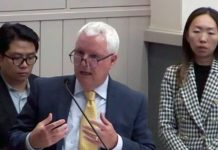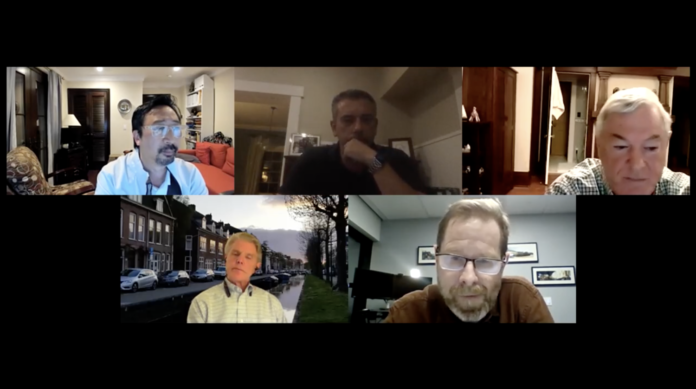“Anyone who reads this needs to know how bad it got,” South Pasadena City Council Member Jon Primuth said March 9. Primuth, who is serving his first term on the council and slated to take over as mayor next December, was talking about the report he and other members of the City’s Finance Ad Hoc Committee (FAHC) were getting ready to release about what led to the City’s summer 2020 financial management crisis and whether they should recommend a “forensic audit” to dig deeper into the dozen-plus adverse findings, or “red flags,” they identified.
“One of the reasons we are talking about a forensic audit,” said FAHC panelist Bill Cullinane, a long time active member of the community and expert in merger and acquisitions, is that “we do not have confidence in the city council.” The council ought to handle this, he said, “but they never have.”
“Look at it from the point of all the councils we’ve had over the past 40 years,” he also said. ”None of them have done a wonderful job in this area. It is a systematically broken system that we have.”
“The fact that you have to push us to do it,” agreed Primuth, “means that we should have been looking into this ourselves.”
“No one really wants a forensic audit,” Cullinane said, “but if we issue this report and don’t recommend that, based on past city council behavior, we all know where this is going.” He said individually, city council members are “wonderful people. But as a body, when you put those guys up in the five chairs, I don’t know what happens.”
More than a forensic audit, Cullinane said, “I’d go for a competent city council. No one will say it out loud, but I am old enough I can afford to do it.”
Although he laughed, Primuth said Cullinane’s point “was legit.” While an audit may not make sense, affirmative steps would constitute a “confidence-building effect of having the city council go through the exercise, and actually want to know. That is valuable. We’d have open up a lot of potential closets,” he warned.
The FAHC released its report June 4, saying that while the red flags it found justify a forensic audit, it was not practical to recommend one now due to the cost, lapse of time and attrition of mostly senior employees who were involved. But it laid out recommendations, including adopting new policies, looking for a new law firm, hiring an internal auditor answerable not to the city manager but to the city council, and other steps that it believes would build citizen confidence and should be undertaken in lieu of an audit.
Due to its status as an “ad hoc committee” city officials said the panel wasn’t required to abide by Brown Act rules that would have required public meetings. Even so, in its final report the panel elected to include a link to a recording of its March 9 discussion–the second-to-last held before the report was issued.
Release of the recording is an exceedingly rare event in that affords citizens an opportunity to watch city officials and knowledgeable members of the community during a very candid discussion about the internal management issues that gave rise to the crisis and what to do about it. The two-hour session is here:
The report has serious findings for Assistant City Attorney Teresa Highsmith, a partner at Colantuono, Highsmith and Whatley (CHW); City Treasurer Gary Pia; and former City Manager Stephanie DeWolfe, among others. Highsmith was demoted without explanation last August from city attorney to assistant city attorney, nominally at the behest of CHW; DeWolfe was pushed out the following month and Pia announced in February he will not seek a third term.
DeWolfe, panelist Gregory Chun said, was “weaponizing our city against its citizens.”
Neither Pia, DeWolfe or Highsmith responded to requests for comment this week but in an email CHW lead partner Michael Colantuono, described by the firm’s website as “perhaps California’s leading expert on the law of local government revenues,” told the South Pasadenan, “We regret the committee’s erroneous conclusions and deny any errors on our part. Out of respect for our client, however, we will not argue these issues in the media.”
The report was discussed, received and filed by the Finance Commission June 9, and is the last item on the long agenda for tonight’s city council meeting.
Reviewing one section of the report, Primuth on the March 9 recording recommended scrapping phrases such as “lack of sufficient…” in favor of “…material weakness from the city’s internal auditor were not addressed and financial reporting continued to be untimely.”
“Punch up the headline,” he urged. “You can put in the action words.”
For another section, Primuth suggested coming down harder on City Treasurer Gary Pia. “Had the city treasurer properly reported that fuller-looking forecasts were not being reported, the city council would have had timely notice of this significant failure in financial reporting.”
“Had policy been followed,” FAHC panelist Steve Rossi countered, “Gary Pia would not have been able to certify to a report, which would have been a direct report to the city council and therefore the city council would have been made aware significantly earlier about how far behind they were.”
“Let’s make that the headline!” Primuth exclaimed.
The final draft left Pia’s name out of the finding.
The panel had a similar debate over how strongly to relate what the auditor found to be at least 18 “potential violations” of the city’s purchasing policy, including at least two–according to the FAHC report–that “on their surface” should have gone to the city council for approval, but were instead executed only by DeWolfe and Highsmith.
Panelist Fred A. Findley, who chaired the Finance Commission during the crisis and remains a Finance Commission member, remarked that in practice what should have happened was after receiving the audit, the council should have “started asking questions” and charged a committee to investigate. The city audit was 19 months overdue at the time, he noted.
“You may have alarm bells going off” Primuth replied. And staff is busy “trying to right a sinking ship as they learn more, and so red flags that they should talk about are something they can’t talk about because it leads to a whole series of revelations and they want to address that before it becomes out of control.” That’s just damage control, he added, something often done “for the sake of the greater good.”
The discussion turned to the panel’s recommendation for a new independent internal auditor.
“The city council has consistently proven that they do not do a good job of managing the city manager,” said Cullinane. “It’s an unfair battle. You are part-time with information that is filtered by the fox guarding the hens.” Without an auditor, “there is no reason that what happened won’t happen again. You can almost count on it” he said, especially as the city grows, handles more money, has more issues and council members remain part-time.
An auditor won’t make things perfect, “but we do break some 101 business rules having the city manager report directly to city council,” he added. “If five people are managing a person, no one is managing. That’s been proven over and over again.”
Primuth was concerned an independent auditor could undermine the city manager or deter new recruits to the job.
“I heard stories about how difficult it was for us to get and hire a city manager and how we should be very happy to have gotten what we got,” said panelist Gregory Chun, referring to City Manager Arminé Chaparyan, who signed on with the city a year ago this month.
Primuth did not dispute this but said Chaparyan “knew the real situation. She knew we had a lot of healthy things going on in the city.” Some of the other candidates, he said, “looked at the circus and disruption and thought it was a very unhealthy, dysfunctional city.”
The panel also made recommendations for the adoption of formal policies and practices. Absent authorization from council, a city manager has wide discretion over policies. “Right now the city manager can take all the policies and procedures and throw them in the round file,” Cullinane noted. “That’s not a good way to operate.”
There’s a bigger problem,” added Chun. “Our policies and procedures are non-existent.” He said when the panel asked for the city’s polices, “you guys remember what we got back. It was pathetic”—just “a few sheets of paper,” he recalled.
“This is where we have to be careful about infringing on city manager authority,” Primuth observed, “but this is obviously where we want to infringe for the protection of the public interest.”
At least by codifying some policies and procedures, you have “thrown up a guardrail,” Cullinane added.
The panel’s most detailed discussion was over how to phrase then-City Attorney Highsmith’s reporting to the council about the city’s litigation reserve and insurance coverage. Their findings suggest Highsmith had a conflict of interest in part because her firm was litigating a case on behalf of the city whose costs could and did rise substantially to nearly $600,000, while telling the city council and auditor that the city was fully covered, even though the insurance company had taken the unusual step of informing the city it might not cover the case.
For years the city maintained a $500,000 reserve for litigation costs over and above its coverage. But the prospective costs for which it was to be used excluded a single case–the city’s litigation with citizen Alison Smith over a sewer leak. The Smith case happened to be the one case that, rather than being assigned to outside counsel, was being handled by Highsmith’s firm, which claims an expertise for so-called inverse condemnation cases such as the Smith litigation.
The panel’s recommendation for the restoration of the reporting of legal costs on a case-by-case basis also stemmed from “conflict of interest,” Rossi said. He noted that within a month after citizens started raising questions about legal costs and about the Smith case in particular, case-by-case cost reporting disappeared from the Council’s agenda packets.
Primuth pointed out this was discussed at length during a city council meeting and commented on by Highsmith. The case was made that less detailed cost reporting helped the city because opponents in cases the city is pursuing can make inferences about strategy by tracking legal costs. Cullinane questioned the notion “that if you know what the defense is spending, you get some additional leg up. Never been a big fan of that argument.”
Moreover Rossi noted the bulk of the pubic questions over legal bills had to do with the Smith case and that it was this discussion that prompted the change in cost reporting. “You were getting input from the city attorney who is employed by CHW, the very person who had the potential conflict of interest.”
The other panelists all nodded. “Therein lies the rub,” Rossi emphasized.
Rossi was pointing out the obvious, Cullinane said. CHW “wants to defend that. They have a conflict of interest in defending, [so] ‘let’s obscure this.’”
“We should just make it plain,” Primuth said, “that we assume that by having a conflict of interest, we think it is highly likely that the legal advice that was provided to the council was tainted by conflict of interest and was not truly objective, professional and thorough.” Fearing it would undermine its credibility, the final report used slightly weaker language.
The panel was also concerned about how much an audit might cost. Rossi said it could be worth if there was a culture where a potential whistle blower was terminated rather than dealing with the issue. If so, there are likely other staff members who, like members of the community who expressed to him similar sentiment—say they are “afraid to raise their hands, because they were afraid of getting targeted by the city.” If so, it is worthwhile “to put a stake in the ground saying this type of activity is not tolerated.” A forensic audit might be that stake. “We want a culture that wants people to raise their hands. When they see something, say something, and we are not going to target you as a result.”
Here are findings the FAHC made:
1.1 A Finance Department reorganization led to a significant reduction in Finance
Department staffing levels.
1.2 The reorganized Finance Department had inexperienced leadership.
2.1 Questionable circumstances surrounded the timing of, and the process undertaken, to engage Citygate.
2.2 The City Council appeared to have used, extensively and inappropriately, closed session City Manager performance reviews to conduct other business unrelated to the City Manager.
3.1 The Finance Department failed to reconcile bank accounts timely.
3.2 The City lacked controls or procedures to alert management to the Department’s unreconciled accounts.
3.3 The Finance Department failed to prepare forward looking projections of the City’s cash position nor was the Monthly Liquidity Report certified by the City Treasurer as required by the City’s Investment Policy.
4.1 The prior City Manager used her authority to undermine the spirit of the City’s purchasing policy requiring City Council approvals of major contracts.
5.1 The City did not have a policy or practice of accruing an actual reserve against its legal liability.
5.2 Official representations that the litigation liability reserve was an actual accrual for anticipated liability expenses were based on inaccurate statements made by City Attorney Highsmith and Councilmember Mahmud with no internal review process by the Finance Department, Finance Committee, City Manager, City Council, or the City’s outside audit firm, resulting in the filing of a potentially inaccurate 2018-2019 CAFR.
5.3 The City filed and received the 2018-2019 audit report containing a legal liability estimate without adequate due diligence.
5.4 The City’s potentially inadequate due diligence or policies regarding litigation risk assessment and risk management led to approximately $600,000 of litigation and settlement costs born by taxpayers.
6.1 The City discontinued its semi-annual report on expenses for attorneys, consultants, and lobbyists.
6.2 The City reduced the detail provided in its Legal Billing Disclosures amidst resident concerns regarding conflicts of interest regarding the City Attorney’s employment by Colantuono, Highsmith, and Whatley.
6.3 If the City had maintained the frequency and detail of legal expense reporting, the disclosures would have alerted the public to large fluctuations in legal expenses from year to year.















.png)










